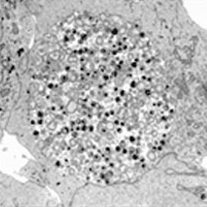Is Heart Disease an Infectious Condition?
Heart disease is the number one killer in the United States. Currently, one in four deaths is caused by the condition (CDC 2018). Generally, most people attribute heart disease to high cholesterol, poor diet, lack of exercise and stress (French 2001). And while I don’t want to dismiss their contribution, other factors appear to be relevant. In research that has spanned decades, infectious conditions are emerging as a concern for contributing to heart disease.

Chlamydia pneumoniae and Chlamydia trachomatis are two bacteria in the same family. While Chlamydia pneumoniae is known for causing pneumonia, Chlamydia trachomatis is a common sexually transmitted disease. While pneumonia from C. pneumoniae is usually not severe, there are concerns about persistent infection that may lead to a number of chronic conditions, including arthritis, asthma and heart disease. There’s also some concern that C. pneumoniae may be related to Alzheimer’s dementia which I covered previously here.
Chlamydia Found in Atherosclerosis Plaques
Atherosclerosis is generally considered the precursor to heart disease. It involves a fatty/waxy buildup in the walls of your arteries called plaques. When the plaques become severe, they can block blood flow. In addition, the buildup can calcify or rupture and release particles large enough to block blood flow downstream, potentially causing strokes, heart attacks and pulmonary emboli (blood clots in the lung).
Recent Studies
Interestingly, upon investigation, studies have found the presence of chronic C. pneumoniae infection in a high percentage of heart disease patients. A recent study from China showed 42% of patients with heart disease were infected with C. pneumoniae as compared to 0% of healthy controls. In addition, more severe heart disease correlated with higher rates of infection (Xue 2019). In a sample from Moroccan heart disease patients, 86% had C. pneumoniae bacteria found directly in the arterial plaques (Yazouli 2018). Interestingly, 12% of the patients with heart disease and the presence of C. pneumoniae infection didn’t have other risk factors for the condition. This could potentially indicate that just infection with C. pneumoniae in some cases might be enough to cause heart disease.
A study from Poland found similar percentages with DNA of C. pneumoniae bacteria detected in the arteries of 70% of patients undergoing arterial bypass surgery (Kuczaj 2016). A study out of Iran found a lower percentage, yet still 25% of arterial samples contained bacteria (Assar 2015).
Meta-analyses of C. pneumoniae and Heart Disease
A meta-analysis of all studies using antibody testing came to the conclusion that inflammation from chlamydia infections was a contributing factor to atherosclerosis and heart disease (Filardo 2015). An earlier meta-analysis that included testing for bacterial DNA also concluded that the data supported the fact that C. pneumoniae almost doubled the risk for heart disease (Chen 2013). While negative studies exist, overall the evidence is suggestive that C. pneumoniae infection is a likely risk factor.
Is Treatment Possible and Effective?
With the amount of data that supports the relationship between C. pneumoniae infections and heart disease, what can we do? Studies exploring antibiotics have been quite mixed. And while more evidence continues to link C. pneumoniae to heart disease, research into treating C. pneumoniae has languished. To some degree, the decline in studies attempting to clear chronic C. pneumoniae infections from arterial plaques is likely due to the failure of antibiotics to effectively improve the situation.
The last comprehensive evaluation I could find on antibiotic approaches for treating heart disease was published in 2005. The conclusion was negative: antibiotics did not decrease death or heart attacks (Andraws 2005).
Natural Approaches
I would be amiss to claim that herbal or nutritional supplements have evidence showing success for clearing chlamydia bacteria from tissues. However, some studies may suggest potential approaches.
Iron
Elevated levels of iron have been found associated with C. pneumoniae bacteria in heart valves (Nystrom-Rosander 2003). Iron is a known factor necessary for C. pneumoniae bacterial growth. Too much iron is also known to contribute to inflammation, which may be relevant for the development of heart disease (Alpert 2004). While we definitely need enough iron, too much can essentially build up and “rust” causing damage to organs, including the heart (McDowell 2020). Getting iron levels checked and treating both high and low levels appropriately is important for maintaining health.
Natural Anti-inflammatories

Natural anti-inflammatories have been shown to have potentially positive effects on heart disease. While their impact on C. pneumoniae hasn’t been studied directly, it’s not unlikely that they work in part through helping control the inflammation from infection that leads to arterial damage. A number of herbs or constituents from plants have at least preliminary evidence for benefits in heart disease including:
- Curcumin (Banez 2020)
- Resveratrol (Banez 2020)
- Ginseng (Shaito 2020)
- Ginkgo biloba (Shaito 2020)
Magnesium
Magnesium is an anti-inflammatory mineral that’s commonly deficient in the United States. The minimum recommended by the federal government is 300-350 mg for most adults. Average consumption in the U.S. is just 290 mg, coming in under the recommended minimum (Ford 2003).
Unfortunately, low magnesium may be a risk factor exacerbating most chronic disease through increased inflammation (Nielsen 2018). For heart disease, the latest research on magnesium shows a clear association. As magnesium consumption goes up, heart disease goes down (Zhao 2019). While direct effects on C. pneumoniae remain unproven, it’s likely that magnesium protects from heart disease risk.
Conclusion
Heart disease and plaque buildup within the arteries appears to be correlated with C. pneumoniae infection. With heart disease being the number one killer in the United States, it’s worth considering approaches to help treat the condition. While antibiotics have proven ineffective so far, natural approaches that decrease inflammation through eliminating excessive iron, improving magnesium intake and anti-inflammatory supplements have research support suggesting considerable benefits for heart health.



